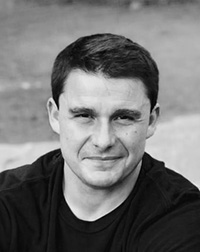poems by
Andrei Guruianu
Poetry chapbook, 96 pages, $14 cover price
ISBN: 978-1-59948-184-5
$14.00
In stock
poems by
Poetry chapbook, 96 pages, $14 cover price
ISBN: 978-1-59948-184-5
 Andrei Guruianu is a Romanian-born writer currently living in Vestal, New York. He is the author of a poetry collection, Days When I Saw the Horizon Bleed (FootHills Publishing, 2006) and a chapbook, It Was Like That Once (Pudding House, 2008). He teaches at Ithaca College and Binghamton University where he is also pursuing a Ph.D. in English. Guruianu is the founder and editor of the literary journal The Broome Review (www.thebroomereview.com) and currently serves as the Broome County Poet Laureate 2009-2011.
Andrei Guruianu is a Romanian-born writer currently living in Vestal, New York. He is the author of a poetry collection, Days When I Saw the Horizon Bleed (FootHills Publishing, 2006) and a chapbook, It Was Like That Once (Pudding House, 2008). He teaches at Ithaca College and Binghamton University where he is also pursuing a Ph.D. in English. Guruianu is the founder and editor of the literary journal The Broome Review (www.thebroomereview.com) and currently serves as the Broome County Poet Laureate 2009-2011.
Andrei Guruianu’s Front Porch View is a collection of vignettes in a world that really doesn’t much allow for the poetry of people sitting, talking, laughing and playing music on front porches anymore. Guruianu’s poetry is one long blues song, 21st century America currently crashing all around us. The power of Front Porch View resides in the beauty and dignity the poet distills from his and others’ lives through his heart-shaking language. A book for our times.
Susan Deer Cloud, recipient of a National Endowment for the Arts Literature
Fellowship and author of The Last Ceremony
Dark exuberance? Exuberant darkness? Both phrases describe the power of Andrei Guruianu’s poems in this vivid autobiographical collection. A sense of flight and settling, coming and going, leaving and staying moves through them as he observes and interprets the people and places of his life with the quick intelligence of a wild bird intent on survival, or a traveler who knows home is a haven as long as the door doesn’t shut too tight.
Katharyn Howd Machan,
author of REDWING: Voices from 1888,
and former poet laureate of Tompkins County
THE LONGEST MORNING
If this poem had been written by Billy Collins
it would probably have been called
“charming” and “graceful” or “subtle”
yet “engaging” by the New Yorker magazine,
Entertainment Weekly, or one of a dozen or so
Post Gazettes across the country.
But it wasn’t.
And so it will remain merely a poem
about insomnia, my insomnia,
my waking up six times a night
to pick at leftovers in the fridge,
check email, go to the bathroom,
and observe how the night fades
into a ghost of its former self
a bit past four in the morning.
Even at that hour there are headlights
floating down my street,
little boats of light bobbing
to the bends in the aging blacktop.
What job or thought, what awful need
could be driving those people from their beds
and out into the cold of coming dawn?
And do they also see my yellow kitchen light,
one bulb barely reaching to the street,
and wonder what madman lives at this address?
What strange creature in boxers
and faded alma matter T-shirt
stares out the window at that hour
with a glass of warm milk in one hand,
the other rubbing one red, bleary eye?
By the time the road turns into one long,
steady stream of engine noise,
the cat is calling, the dog is scratching to be let outside.
It is morning.
Only the bird is quiet, still,
knowing that if he wakes it only means
the hour is prolonged, dragged out
while peeking through the steel bars of a cage.
There’s nothing unexpected about that,
nothing sublime, no irony or grace.
Nothing to be pared down into a blurb,
just another autumn day
filtered through a set of two uneasy eyes,
and the light falling in wide, sloppy patches
down to the yellow wood.
WHEN YOU KNOW IT IS TIME TO LEAVE A PLACE
Because when you’ve seen
one dying mill town
you’ve seen them all.
Streets of many churches,
vacant houses
coming apart at the seams.
Bars struggling to stay alive.
Even the bars!
The old Italians and the Irish
are the only ones riding it out.
Along the sidewalks,
stores and restaurants close at dusk,
and the corner drunk,
who everyone refers to
as the corner drunk,
says with a finger
pointed to the sky,
“there’s something better up there.”
Even the doormen shut their eyes,
annoyed with trying
to imagine clouds on a clear day.
THE GAMES WE PLAYED
When we were young
it was important that we never missed.
Everything was about winning or losing.
Everything mattered.
In broad daylight
we stood up and pulled flimsy triggers,
took shots at what we couldn’t see.
Dust rose from the impact of our fallen bodies.
Each day we took turns dying,
and each day we were reborn
as from a mother’s kiss,
ordinary miracles we took for granted.
We still take aim now, play the game,
because we’re brave or foolish
but the falls hurt more,
the ground is less forgiving.
And each time it gets harder
to sit up with a smile, brush off the dirt,
walk away as if none of this ever happened.